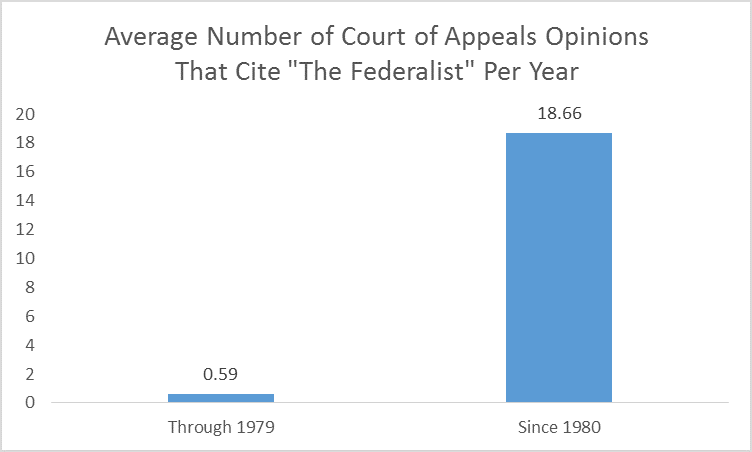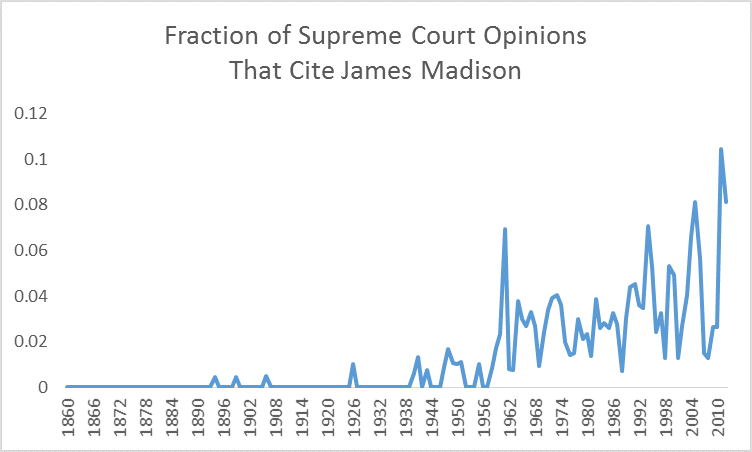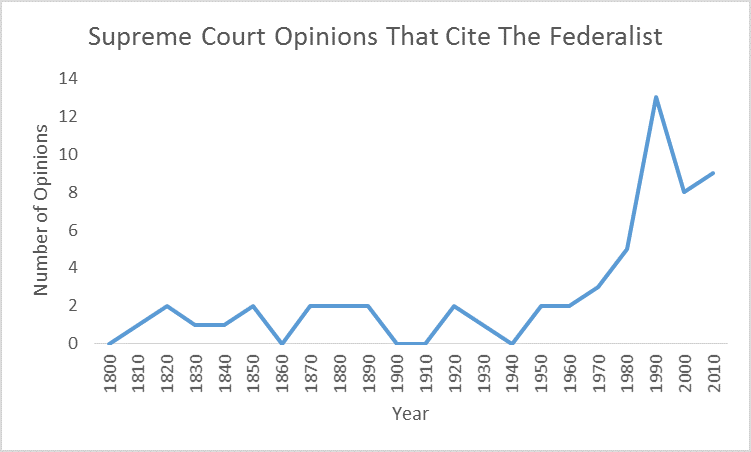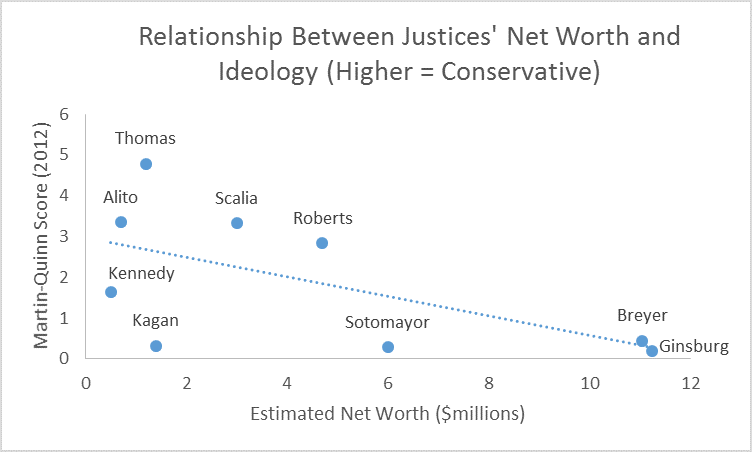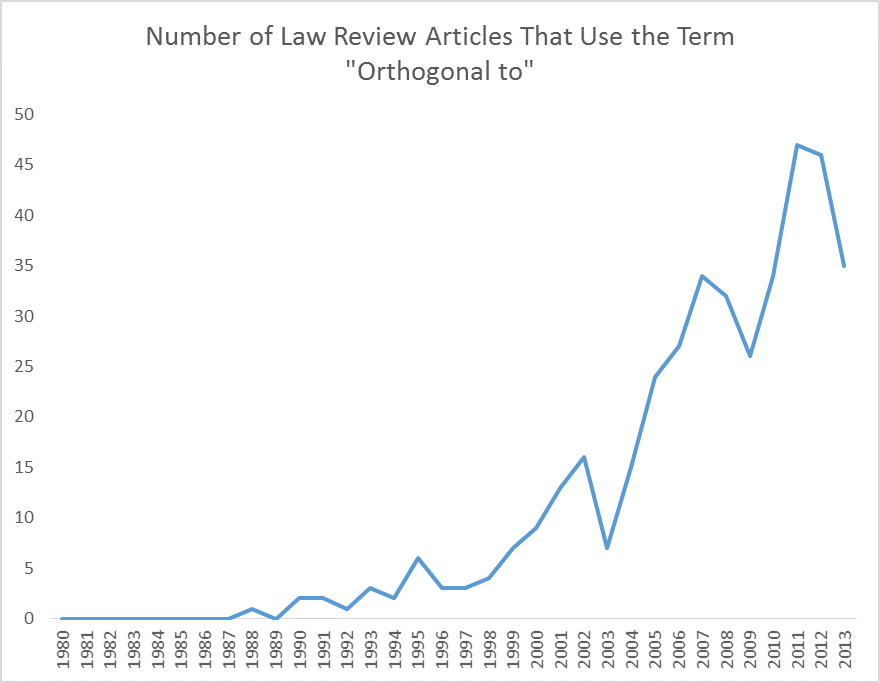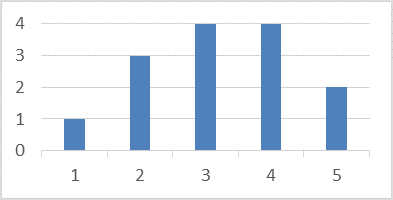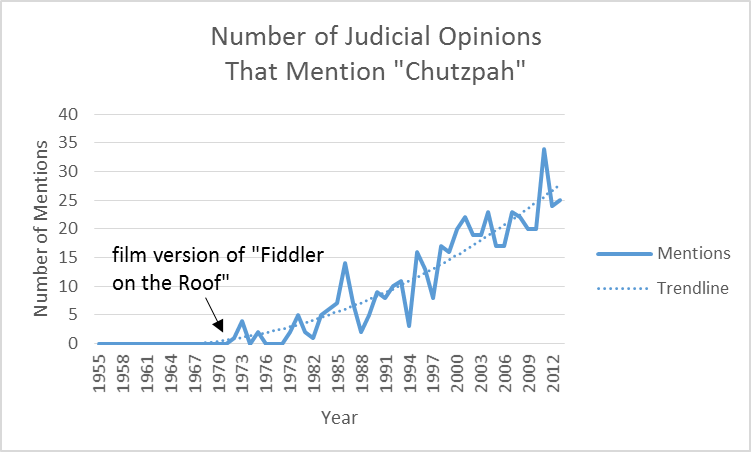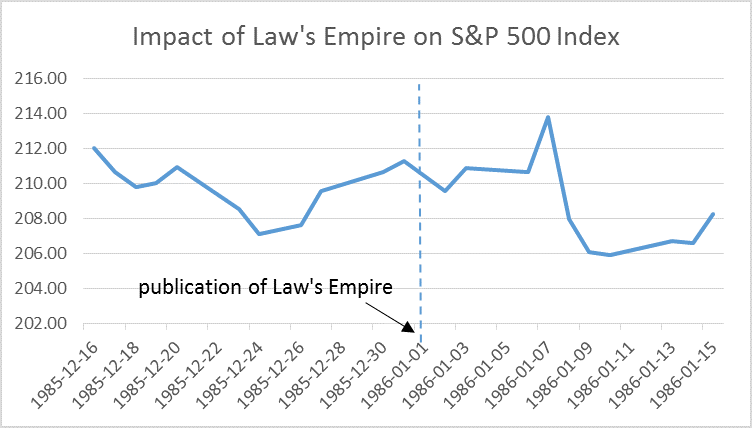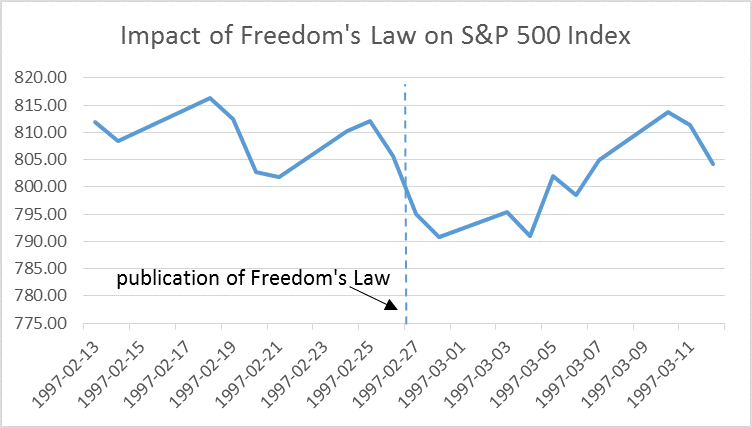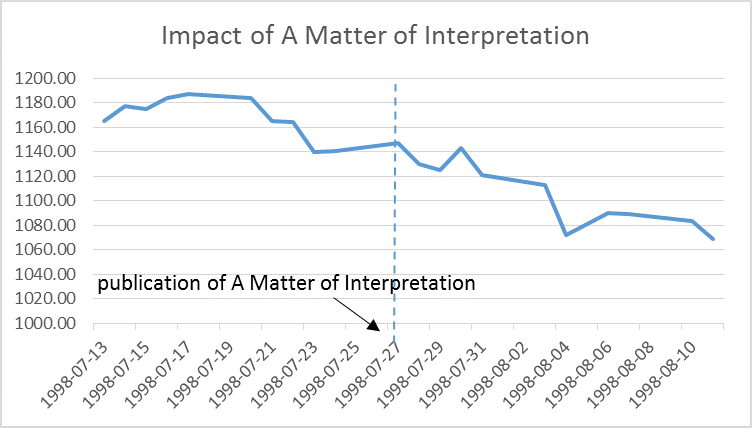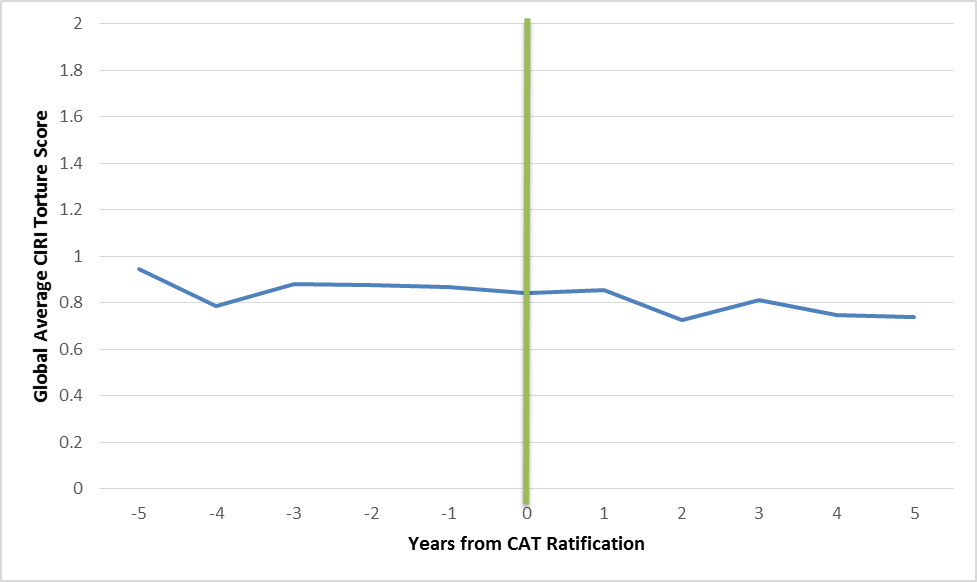How did the Republic survive its first 190 years? Source: Westlaw.
Category Archives: BLOG
Originalism class 2: Printz as a paean to the living constitution
Will asks whether originalists should be heartened or troubled by Campbell’s debunking of Justice Scalia’s historical analysis in Printz. However, the majority opinion is not originalist at all. Scalia doesn’t address the historical materials with any rigor; he argues (quite candidly) that the anti-commandeering principle is consistent with the historical record, not that it emerges from the best reading of the historical record. Where does that principle come from? Precedent: “Finally, and most conclusively in the present litigation, we turn to the prior jurisprudence of this Court.” Scalia thinks that New York v. U.S. controls, and the weak foundation-era history provides no basis for overturning it. Would Scalia have switched sides if Campbell’s work had been before him? Hard to know, but I would not advise Congress that it is now free to commandeer.
On The Federalist Papers, given the specific political use for which they were written and published, there is little reason to believe that they represent a general account of the original understanding as it existed in all 13 states. The reason that The Federalist has fetish-value today is simple: it has been cited over and over by the Supreme Court, and so has become a source of constitutional law that supplements the text and other materials.
Would Madison have been pleased or embarrassed?
Source: Westlaw, Supreme Court Compendium (thanks Lee and Bill). N.B.: I’m not distinguishing majority and other opinions. I suspect JM appears in more majority opinions as time passes. (The y variable is the number of cases in which at least one opinion cites JM divided by total number of cases for that year.)
Cost-benefit analysis of financial regulation
The supreme court’s citations to The Federalist Papers
Are richer justices more conservative?
Does regulation kill jobs?
This is the title of a new book edited by Cary Coglianese, Adam M. Finkel , and Christopher Carrigan. The book contains a chapter by me and Jonathan Masur, which builds on, and responds to criticisms of, our earlier article, Regulation, Unemployment, and Cost-Benefit Analysis. In the chapter and article, we argue that when agencies conduct cost-benefit analysis, they should take into account the effects of regulations on job loss.
The book has a broader scope. It focuses also on the larger question on whether regulation kills jobs. The answer, unavoidably, is sometimes. Our view is that even when it does, regulations are justified when the benefits are large enough, and agencies need to make sure this is the case by conducting cost-benefit analysis properly.
Noel Canning to be argued today
Here is my Slate piece criticizing the originalist argument for ruling that President Obama violated the recess appointments clause. A while back I criticized the “the” argument. (Slate used the genius-level headline “Indefinite Articles”). Will Baude co-authored an interesting amicus brief that makes the originalist case for affirming and further argues that if you’re not an originalist, you should defer to the Senate’s right to define what a session is, so either way the president loses.
Are the good times over?
A Winner’s Curse?: Promotions from the Lower Federal Courts
New paper on SSRN:
The standard model of judicial behavior suggests that judges primarily care about deciding cases in ways that further their political ideologies. But judicial behavior seems much more complex. Politicians who nominate people for judgeships do not typically tout their ideology (except sometimes using vague code words), but they always claim that the nominees will be competent judges. Moreover, it stands to reason that voters would support politicians who appoint competent as well as ideologically compatible judges. We test this hypothesis using a dataset consisting of promotions to the federal circuit courts. We find, using a set of objective measures of judicial performance, that competence seems to matter in promotions in that the least competent judges do not get elevated. But the judges who score the highest on our competence measures also do not get elevated. So, while there is no loser’s reward, there may be something of a winner’s curse, where those with the highest levels of competence hurt their chances of elevation.
Originalism: history vs. law
Will says that the Supreme Court could have held in favor of Heller on simpler and more intuitive grounds than those laid out in Scalia’s opinion. The purpose of my earlier post was not to argue that a well-reasoned originalist opinion could not be written but to point out that the actual opinions (by Scalia and Stevens) were poorly reasoned and written, and to raise the suggestion that originalism, as practiced by judges, lends itself to bad historical reasoning because judges are not historians but lawyers, and (by necessity) do law-office history rather than real history. Indeed, this very point about the difference between history and law-history is Will’s (“what seems like an intractable historical debate is really solved by a legal or interpretive question about what kind of history matters”). But if Will is right, this disconnects originalism from one of the theoretical reasons for its appeal.
The very reason identified by Michael Rappaport, who says that originalism is appealing because the “idea that a written law should have the meaning that it had at the time of its enactment seems extremely intuitive and part of how we understand legislation and other written enactments.” Exactly: the real understanding, not the understanding that is constructed from legal rules that permit some types of evidence and exclude others–the presumptions, fictions, and tie-breakers that are necessary to facilitate decision-making and enhance the predictability of law. But this is in tension with his statement “the ordinary person is usually an originalist.” Maybe a historical originalist but not a law-office originalist.
But I’m not so sure that the ordinary person is any kind of originalist, because it’s pretty clear that the ordinary person has all kinds of ideas about what his constitutional rights are that cannot be traced to the original understanding—for example, that the national government cannot discriminate on the basis of race, or that government can’t censor artistic expression that offends community standards. In fact, the direction of causation probably goes the other way: people read into history whatever constitutional rights they think they should have now. Our constitutional culture is the residuum of a struggle to reduce the cognitive dissonance between reverence for the founding generation and commitments to modern-day rights and government structure.
Inside or outside the system?
Suppose you agree with Madison’s theory that the government should be divided into three branches so that the ambition of each counteracts the ambition of the others. Now a case like Noel Canning arises, in which the executive clashes with the legislature. You ask the Supreme Court to resolve the dispute by enforcing the original understanding of the Constitution, tradition, or whatever other relevant factor under your favorite constitutional theory. Is your prescription consistent with your diagnosis of the problem? Can a (by hypothesis) ambitious judicial branch be expected to resolve a dispute fairly between the other two branches? Wouldn’t it instead resolve the dispute in a manner that maximizes its own power? In which case, why should you bother to argue that it should do otherwise?
These questions are the topic of a new paper I wrote with Adrian Vermeule, just published in the University of Chicago Law Review.
Originalism and Noel Canning
Speaking of originalism, in Slate I criticize originalist arguments made in amicus briefs for the Noel Canning case, which will be argued next Monday. I fear that the Supreme Court’s Noel Canning opinion will be another Heller.
Originalism seminar class 1: Heller
Originalism seminar: questions for first class
For our first meeting of the originalism seminar tomorrow, we’re reading Heller, the Sunstein/Barnett debate, and the Brest article. Here are some (possibly leading) questions for students to think about ahead of class. If time permits, I will provide my own answers in a later post.
Heller
Does this case represent the triumph of originalism because both sides dwell on the original understanding of the Second Amendment or a failure because they don’t agree on what it is? One argument for originalism is that it constrains judicial discretion; well, does it?
Does Scalia or Stevens provide the better account of the meaning of the Second Amendment? One thing to ask yourself is how carefully you think the drafters of the Constitution chose these words, and whether the people who approved the Constitution thought about them as carefully as the Court implies. In this connection, my eye was caught by Scalia’s statement that “the fact that the phrase [‘bear arms’] was commonly used in a particular context does not show that it is limited to that context.” Sensible way to interpret a clause?
Do you think a historian who was conscientiously trying to figure out how people understood the Second Amendment would write the way Scalia and Stevens do?
Justice Scalia says Miller does not control the Court because it was not a thorough examination of the Second Amendment. What if it had been—but had come out the other way, like Stevens’ opinion? Would Scalia have decided Heller differently?
Sunstein/Barnett
What are the politics of originalism—and the politics of those who criticize originalism? Is originalism “conservative,” or, as Sunstein argues, “radical” (or “fundamentalist”), or neither? Note the disagreements about rhetoric as well as politics and law. Is it unfair to refer to a “Lost Constitution” or a “Constitution in Exile”?
What is their core disagreement about originalism? Notice that Barnett returns again and again to the question of judicial discretion, and Sunstein to the question of good outcomes (do we want to live under a Constitution that permits the government to discriminate on the basis of race and sex?). Do they engage? To what extent does the argument for originalism depend on the argument against its alternatives?
Brest
“The interpreter’s understanding of the original understanding may be so indeterminate as to undermine the rationale for originalism” (p. 222). Comment.
What entrenched and/or popular constitutional doctrines does originalism rule out? See p. 224 and refer back to Sunstein and Barnett.
What are the “ends of constitutional government” that a good theory of constitutional interpretation must serve, according to Brest? Do you agree with Brest that those are the ends of constitutional government? And how do they connect up with the Ely/Bickel approach that Brest commends?
Judicial chutzpah
Originalism and its critics
This quarter I co-teach a seminar on Originalism and Its Critics with my new colleague, Will Baude. I have long been skeptical of originalism, and my interest in it is more sociological than intellectual. I hope to learn from this seminar why originalism is appealing to so many people (but mainly conservatives), and why it plays such an important role (at least, as a matter of rhetoric) in constitutional politics. If you are interested, here is our syllabus (Originalism and Its Critics syllabus dec. 12). I will post reactions to the articles as I read them, and perhaps Will will post his own reactions at the Volokh Conspiracy where he blogs.
The Social Value of Legal Scholarship: An Empirical Study
Adam Liptak likes to torment law professors by regularly quoting judges who do not read law review articles. However, a more rigorous test of Liptak’s hypothesis that legal scholarship has no social value is called for, and so below I report some early results from a test that uses event-study methodology familiar from securities class action litigation.
My starting assumption is that if legal scholarship has social value, the publication of any major piece of legal scholarship should be visible in stock market returns. I start with one of the most prominent law books of all–Ronald Dworkin’s Law’s Empire, which was published on January 1, 1986.
Alas, there is no evidence that Law’s Empire had a favorable impact on stock market returns. Thinking that this was perhaps anomalous, I checked Freedom’s Law, which was published on February 27, 1997.
Again, nothing. A possible explanation is that Dworkin was a lefty, and so his scholarship would most likely have a negative impact on the economy. Accordingly, I also checked the stock-market impact of Antonin Scalia’s A Matter of Interpretation.
Another discouraging result. Yet I take some comfort in the thought that I have not fully controlled for endogeneity. Maybe, for example, Dworkin timed the release of his books to coincide with declines in the stock market, when a despairing public would seek refuge in philosophical contemplation. Or maybe stock prices incorporated the impact of Scalia at the time of his birth in 1936, as the Efficient Capital Market Hypothesis implies. I believe that these possibilities should be investigated in future research conducted by others.
What has been the effect of the Convention Against Torture?
The x-axis shows the five years before and after a country ratified the CAT. Year 0 is the year that the country ratified the CAT. For example, year 0 for the United States was 1994, while year 0 for Nicaragua was 2005. The line shows the average torture score for countries during the five years leading up to ratification and the five years following ratification (where 0 refers to frequent torture and 2 refers to no torture). If the average country had reduced torture during this period, then the line would have sloped up. The data source is Cingranelli-Richards.
